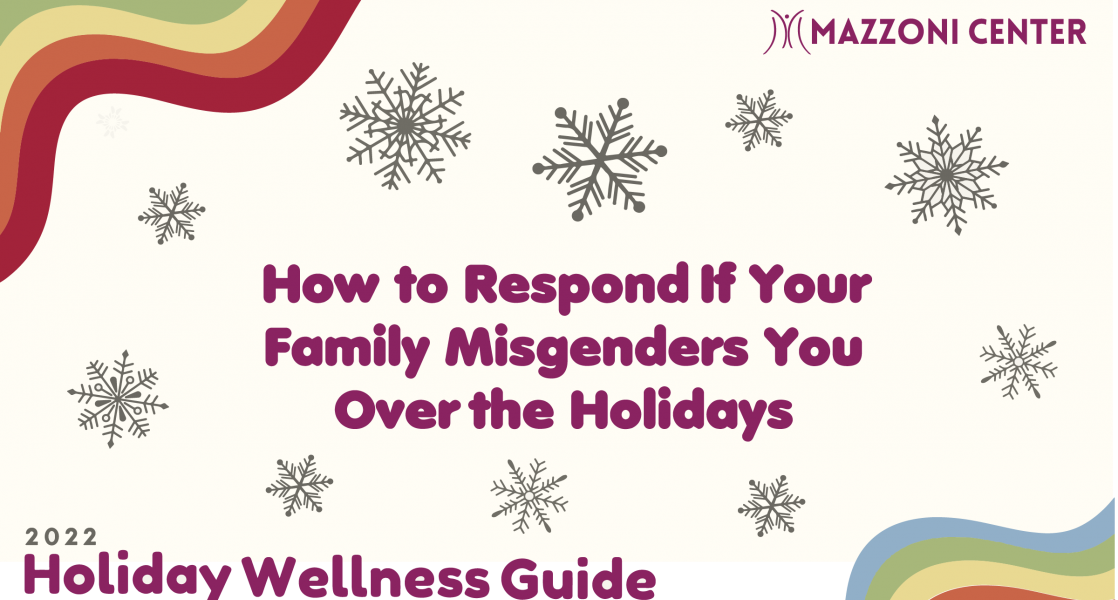How to Respond If Your Family Misgenders You Over the Holidays | Holiday Wellness Guide
How to Respond If Your Family Misgenders You Over the Holidays | Holiday Wellness Guide

It may be called the most wonderful time of the year, but for many trans folx, going home for the holidays can feel scary and lonely. Visiting family can sometimes mean enduring comments about your clothes or hair, getting deadnamed, and being misgendered. If your family misgenders you over the holidays or otherwise invalidates your identity, it’s easy to feel like there’s no place for you at the table. These acts may be intentional or unintentional. They may be big or small. Regardless of the type or intention, they can impact you negatively.
For trans folx, being deadnamed and misgendered are acts of violence. Regardless of how long you’ve been out, being misgendered can feel awful. It erases your identity. It’s invalidating and can be incredibly painful and difficult to handle. It’s not easy being misgendered, but there’s good news! Decking the halls with trans safety strategies can help you to feel strong and supported throughout the holiday season.
Establish your limits
Coming out as any flavor of transgender can sometimes mean being subjected to intrusive questions and inappropriate comments (even if well-intended). From inquiries about surgery or hormones to unsolicited opinions about your appearance, there’s no shortage of inappropriate conversations you might have to endure.
Think about your boundaries before family time; maybe even create a list of topics or behaviors you can overlook and things you cannot tolerate. It is always okay to say “no” or disengage from a conversation that feels uncomfortable. Thinking about your boundaries ahead of time might help you be better prepared for challenging conversations. However, sometimes we don’t know we have a boundary until it’s crossed, which is okay too!
Knowing what you are and aren’t willing to discuss can be helpful when heading into a family event. If a boundary gets crossed, leaving the table, or even the event, is okay if it means ensuring your safety and well-being. If it feels like all eyes are on you, and you don’t want to “make a scene,” it’s okay to pull yourself away from the conversation and address the conflict later. If you know you have allies at the gathering, perhaps asking to grab an eggnog refill or take a lap around the house can serve as a well-deserved break.
Make a game plan
Getting misgendered is overwhelming no matter where you are, let alone at a family meal over the holidays. If you know that your family means to be supportive, it can help to reach out to them directly before the party starts.
Is there a family member you feel close to, or a person that seems to affirm your gender identity? Maybe think about reaching out to them before the family gathering. Sharing your nervousness with someone else at the family function may help you feel less isolated and can provide a go-to person if things start feeling hard. If you don’t have a supportive family or don’t expect to have anyone supportive physically nearby, reach out to supportive friends and let them know you might need to vent or talk to them. In addition to your existing social support system, there are many queer and trans centers, as well as online support groups, that are here for you. Retaining a relationship with your family after coming out can be a huge privilege, but it can still come with stress or feelings of isolation.
If it’s difficult for you to be in the same space as family members who misgender you, remember that you don’t have to stick around to be polite or pretend to make nice. If your family is not trying to use your correct pronouns or name, you don’t have to stay anywhere that feels uncomfortable.
Of course, up and leaving a family gathering may be difficult, especially if you’re feeling pressure not to make a scene or are more introverted. If you’re sensing your safety and comfort may be violated at an event, consider reaching out to the hosts beforehand to say you don’t plan to stay long or asking a friend to call you with a fake emergency, providing a quick way out.
Have something to look forward to
If you know the holidays will be a mess, it can help to think up a few backup plans and different ways to remove yourself from harmful situations.
Try to arrange an alternate plan if family time becomes too difficult. Take a break and do something grounding before re-entering the situation: take a walk, journal about it, text your support people, engage with online community, etc. Plan a special and affirming activity for yourself after the family gathering to celebrate making it through! Knowing that you have something to look forward to after a stressful event can help get you through the awkwardness or pain of the holidays. It can be as little as a cup of tea and a bubble bath or as big as taking a trip. The important thing is to find something that brings you comfort and joy.
Know who has your back
Going to a family event can be particularly tricky if only some people know you’re trans. You may feel anxious about whether or not someone will out you by accident or unsure how to address different family members calling you by different names. It’s perfectly natural to feel the pressure to be out to everyone or be apprehensive about correcting your family when they use the wrong pronouns.
You can talk to the people you’ve shared your gender identity with about your needs and comfort level with the family you aren’t out to. You get to determine who you want to come out to and when. It’s okay not to be ready to share with everyone.
If you’re not out to your entire family, checking in with the family you are out to may help you feel more supported. Ask them to keep an eye on your rude uncle or be ready to go on a running- away-from-haters walk.
Additionally, if you’re out to some family members, but not all, some may try to defend you by correcting others about your pronouns or name change. However, while they most likely have your best interest at heart, your well-meaning cousin telling your grandma that you now use “he/him” may actually be outing you before you’re ready — explain this to them ahead of time. You don’t need to be out as queer, trans, or anything else, before you’re comfortable.
If you have the emotional energy, you could correct your family members by saying something like, “I’m actually using she/her now.” If the misgendering continues, ask a supportive family member to speak up for you. If you don’t feel like you can ask for this support from family, step out and call or text an affirming friend to vent. Think about who you’d like to be able to reach out to for support and affirmation during family time. Have a conversation with them ahead of time to make sure they are able to be your support person and share your needs with them. Be open about your feelings about family; you don’t have to carry them alone.
Knowing who makes you feel validated and supported can be very helpful when heading into potentially uncomfortable areas, like a family dinner party. You have people who love and support you, and if others are making you feel ashamed or dismissing your identity, you don’t have to put up with that. You don’t have to be alone with your fear, pain, or anger.
There’s no easy way to handle being misgendered, especially over the holidays. Having a game plan, restorative events to look forward to, and knowing who you can lean on are just a few things that can help you to make it through family events.
No matter what, all trans angels are strong and beautiful. You deserve to feel protected, celebrated, and given lots of presents every day of the year. At its best, the holiday season is a time to celebrate, eat, and be merry with loved ones, but when it comes to gender — the naughty and nice binary is the only one we need.
This article was put together by Griffin Wynne.
To learn more, download the entire guide here.


